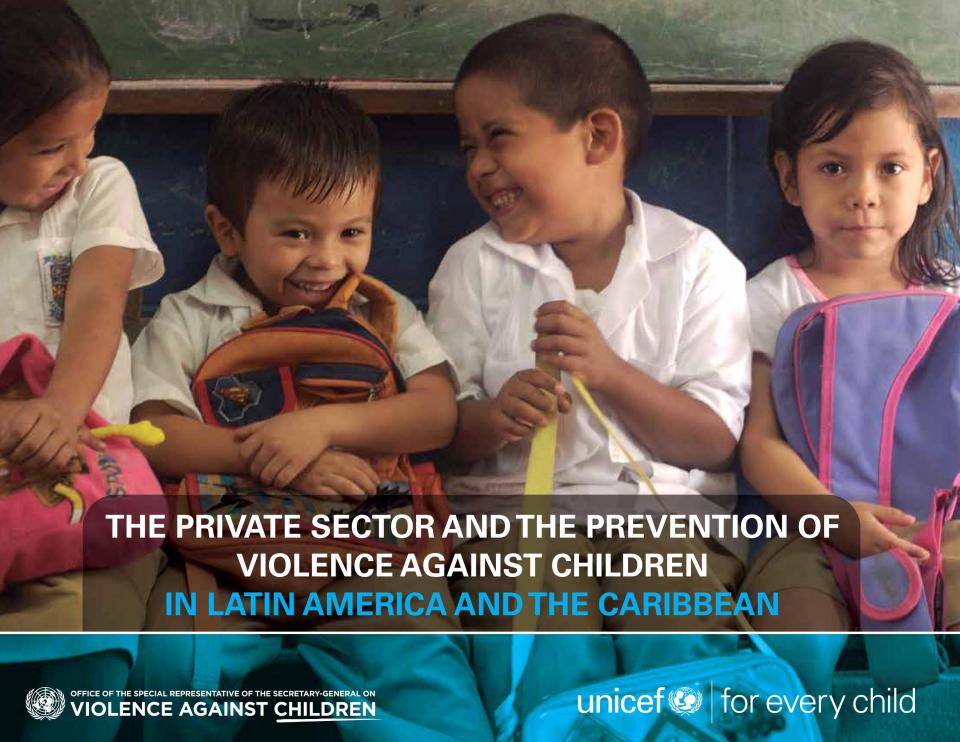- عربي
- 中文
- English
- Français
- Русский
- Español
Investing in the prevention of violence against children is good business

Bogotá, 8 June 2018 - The Office of the UN SRSG on Violence against Children and UNICEF today launched a joint regional publication, “The private sector and the prevention of violence against children in Latin America and the Caribbean”, in Bogotá, Colombia.
“Business investment and innovation are not only major drivers of productivity, inclusive economic growth and job creation; they can also help solve the challenges that compromise children’s right to protection from all forms of violence. It is only when people and communities prosper, that businesses can sustainably succeed,” said UN Special Representative of the Secretary-General on Violence against Children, Marta Santos Pais.
“The private sector and the prevention of violence against children in Latin America and the Caribbean” report presents a set of case studies illustrating how actions by businesses across the region are helping to secure children’s protection from violence, while also pointing out the alarming context of violence against children and adolescents in Latin America and the Caribbean.
“Our joint publication is a key contribution to the realization of children’s rights and the implementation of the 2030 Sustainable Development Agenda, which has the ambitious vision of a world that invests in its children and safeguards their freedom from violence, abuse and exploitation. This report emphasizes the crucial role that the private sector plays in this new development paradigm,” added SRSG Santos Pais
In Latin America and the Caribbean violence affects the daily life of countless thousands of children and the report brings to light disturbing findings:
• Every day 67 adolescents are victims of homicide
• 2 out of 3 children suffer from some type of violent discipline in their home
• 1 in 10 adults believe physical and humiliating punishment is necessary to educate a child.
The study also presents positive regional private sector practices to prevent and address violence against children, and to support increased business investment in violence against children prevention strategies. A few examples of these practices include:
• In Peru, the Soccer Federation committed to the promotion of children’s rights by educating its trainers and young soccer players on preventing violence, creating grievance mechanisms, documenting their practices, and reporting annually on 17 indicators on education, health, participation and protection throughout the country. The parents and caregivers of the
young athletes must sign a commitment to protect the rights of their children at home.
• In El Salvador, to address gang-related violence, the manufacturing company League Central America, adopted a policy of educational and social inclusion, including expanded access to education for children in the community, and through employment opportunities for young former gang members, by providing them with training opportunities, support and follow-up for their personal and professional growth.
• In Colombia, a mobilization and advocacy strategy “LaMuralla Soy Yo” (I Am the Wall), was created to protect children from sexual exploitation associated with tourism, through the training of all business actors, including informal vendors, as well as academics, education institutions, and the media.
The business community can be highly effective in preventing and addressing violations of children’s rights when its leaders prioritize these concerns. Through effective investment in the training of their employees and mobilization of suppliers they can all help to widen circles of protection of children from violence. Working closely with governments they can promote innovative initiatives to: promote a change in attitudes that condone violence; use their influence to strengthen children’s protection; apply resources to inform children and adolescents of their rights; and, advocate for their protection from violence.

